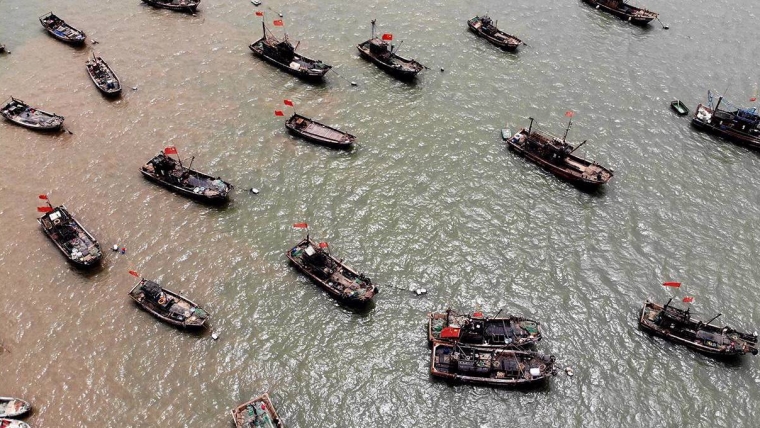
With US and Chinese warships increasingly playing chicken, and China transforming atolls and outcroppings into militarized artificial islands, the South China Sea presents a striking picture of Sino-American strategic competition. But China’s expansive assertion of offshore sovereignty is not only challenging others’ territorial rights and free navigation of international sea lanes. It also is threatening a central feature of the Southeast Asian ecosystem, and thus the region’s economic future.
China has refused to submit its territorial claims to international review, even though six of the ten countries surrounding the South China Sea have claims to various rocks, shoals, reefs, and resources within its 1.4 million square miles. China also has ignored the Permanent Court of Arbitration’s (PCA) 2016 ruling affirming the Philippines’ historic rights to the Spratly Islands and dismissing China’s outsized claim to some 90% of the South China Sea (based on the so-called nine-dash line).
For Southeast Asia’s 600 million people, the territorial crisis in the South China Sea is not some distant future concern. China’s actions already are harming the region’s maritime ecosystems and livelihoods. That is the key lesson of the book Dispatches from the South China Sea: Navigating to Common Ground, by James Borton of the Johns Hopkins Foreign Policy Institute. Putting aside geopolitics considerations, Borton focuses on the ground truth: Chinese exploitation of the South China Sea is threatening the region’s future through the ecological, environmental, and economic damage that it is causing.
Fishing is at the heart of Borton’s tale. According to the United Nations Food and Agriculture Organization, 15-56% (depending on the country) of all animal protein consumed in Southeast Asia comes from the neighboring seas. And the global market reflects this bounty. Though it accounts for only 2.5% of the planet’s ocean surface area, the South China Sea produces 12% of the world’s fish catch. According to Borton, half of the world’s 3.2 million registered fishing boats operate there.
While overfishing is a growing global problem, China clearly contributes to it disproportionately with its long-distance fishing fleet of 2,500 ships (a number that rises to 17,000 if one counts unregistered and illegal vessels). Borton marshals first-hand accounts from fishers, officials, and researchers to show how the South China Sea’s vital resources are being degraded. Around 2,500 species of fish inhabit its waters, but since 2000, catch rates have declined by 70%, and large fish stocks have shrunk by 90%.
For years, China has unilaterally declared fishing bans, supposedly to protect fish stocks. And in 2021, it adopted a new law empowering its coast guard to use force against alleged violators from neighboring countries. And yet, while China’s maritime militia has driven other countries’ boats elsewhere, Chinese fishing operations in the world’s proscribed zones have continued, such that China alone hauls in 20% of the world’s annual catch.
The ecological effects of China’s island-building are no less troubling. The South China Sea was once home to one-third of the world’s coral reefs, but according to Borton, around half have already been lost. Coral reefs around the world are being degraded by the effects of climate change. But as the PCA noted in its 2016 ruling, China has accelerated this destruction in the South China Sea, by dredging up more than 100 square miles of healthy coral reefs to create artificial islands.
Borton sees the failure to resolve the South China Sea crisis as a harbinger of ecological disaster. Highlighting the work of scientists, researchers, and concerned officials, he helps us understand the nature of the challenge and its possible solutions. “Just as the current pandemic requires a collaborative approach, the South China Sea requires scientific cooperation … and open access to data,” he writes. “Science diplomacy can establish … a starting point for regional cooperation” and “a much-needed pause in rising tension.”
Unfortunately, the Chinese government’s failure to do any of these things during the global COVID crisis is a harbinger as well. It has refused to provide basic information about the ecological impact of its island building, even as it expands its territorial claims elsewhere in Asia. And its strong-armed tactics and steady militarization of its newly created offshore real estate hardly suggest that it intends to share data, much less play a constructive role in preserving the region’s ecosystems.
Borton is certainly correct that citizens and scientists ought to collaborate to find ways to bridge the political divide in the South China Sea. But, given China’s intransigence, businesses may be better positioned than governments to take the steps he proposes. From start-ups to technology giants, the private sector is creating new tools that will shed more light on the situation. Satellite systems and artificial intelligence are already being used to collect and analyze massive amounts of climate data for clients and researchers. Microsoft, Google, and Amazon are gathering and publishing more climate data, and business leaders like BlackRock CEO Larry Fink are pushing companies to align their operations with the global climate agenda.
But while Borton has offered a clear overview of the crisis in the South China Sea, comprehending the problem is no guarantee that those with the means to address it will take up the challenge.
Kent Harrington, a former senior CIA analyst, served as national intelligence officer for East Asia, chief of station in Asia, and the CIA’s director of public affairs. Copyright: Project Syndicate, 2022, published here with permission.
8 Comments
Unlike others China makes no pretense of being a responsible international citizen . Their plundering of natural resources will be a game changer international competition for these will ensure ecosystem collapse within a short time frame , as it is occurring now assisted by the willful blindness of nations and their elected representatives.
They were quite happy to consign the baiji (Yangtze River Dolphin) to extinction, and goodness know what else, in the massive damming of a decade or two ago.
They have scant regard for the natural environment, as far as they are concerned it is only there for people to exploit.
Younger Chinese and other Asians are becoming more aware, but I would guess information is limited in China, and young people have zero opportunity to have a say.
Too many people.
Too reliant on raw-down of resource stocks
And when one depletes, others take the load; this is non-linear, this is systemic.
Blaming China is perhaps a tad lopsided; the West has had the run of the planet for 200 years, and hasn't done any better. We all attempt to optimise (it came from energy/food security, that instinct) and one of the optimisation moves is to offload your 'costs' (originally your energy costs). Nowadays, we offload onto 'others'.
This may be horizontal - others in the present, or vertical - others in the future. We're all doing it. ASs fisheries collapse, watch agriculture get asked to take up the slack; even as it gets asked to give way to carbon sequestering, even as it gives way to sprawl, even as it depletes the very soil it depends on.
This will end, but not well for the majority of the cohort currently present.
Does strike me as double folly to start repeating the West's mistakes, a couple of decades after the ramifications became obvious.
The CCP is such a frightening juggernaut, and just refuses to respond to inconvenient questions.
Yes, the CCCP is a dangerous regime, with zero regard for the natural environment. NZers would be concerned if they knew how many partnerships and joint ventures that NZ organisations are deeply embedded in with CCCP-monitored entities. NZ public institutions are very vulnerable and now the NZ govt cannot speak out for fear of losing the multi-million dollar partnerships.
https://www.newsweek.com/chinese-communist-partys-legacy-100-years-one-…
Great article and very thought provoking! I think that China has so many internal tensions that it has difficulty in balancing them all. It's focus on solar and methodical stop/starting coal power stations in response to smog reveals layers of governance that are aware that there are limits to environmental exploitation.
Like other States, it finds expansionism useful both in terms of resource acquisition and geo-political influence. But the basic concern is population: balancing starvation against control is not easy, the appearance of consumer freedom and technological progress replaces dogma for distraction. Our histories of colonialism mean that Western complaints are viewed as hypocrisy, and like any large bloc China requires strategic buffer states to protect itself from potential future military conflicts.
But the terra-forming consequences of land 'reclamation' presents China with as many problems as it solves, both environmentally and militarily: extensions require supply; supply requires resources; why destroy future resources for short term benefit if the strategy also increases potential for conflict?
I wonder to what extent China can still be seen as a totalising entity in the way it tends to be framed by Western media? It has historically played a long game and is resolute that it will not again suffer under imperialism. Our current era of increased Western polarisation probably does mean that businesses have more influence than individual nation states. But finding a better balance between sustainable resource management whilst maintaining strategic advantage is not going satisfy everyone in the region - and to what extent does China realise that its military bullishness is creating problems for itself?
What hasn't been addressed in this article is the now fictional relationship between the financial markets and the so-called real economies. China and US hold each other's debt: no wonder China wants it's own crypto. The islands of the south China sea enable extra-territorial infrastructure beyond shipping lanes or oil, as Amazon et al are doing so in the Atlantic. If businesses are to have influence beyond extraction, then which currency will they invest in?
Would China need to build useless islands if the USA wasn't busy bullying them?
That bit of water is contested for strategic reasons as well as political ones - and notwithstanding the chicken and egg nature of the current round of US-China tensions, Malaysia, Indonesia, Vietnam, and the Philippines all have claims on the region as well. The proximity of Taiwan comes into play too. That's a big concentration of fishing, shipping, and oil resources all in one place. Just pointing the stick at any one State's actions isn't a useful strategy here - there are too many other actors, each with their own competing interests.

We welcome your comments below. If you are not already registered, please register to comment
Remember we welcome robust, respectful and insightful debate. We don't welcome abusive or defamatory comments and will de-register those repeatedly making such comments. Our current comment policy is here.